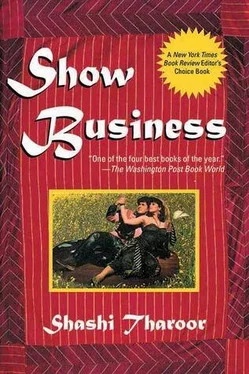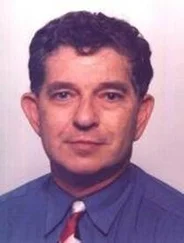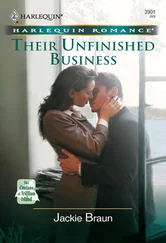But I never really tried to do anything about it. Even when Cyrus, as nonpolitical an adman as ever violated Bombay’s prohibition laws, mentioned it once. “Have you ever thought, man,” he fantasized over his third whiskey one hot, “dry day” evening, “of entering politics?” I looked at him as if he had suggested I put on a loincloth and a tin helmet and do a mythological film. “Really, Cyrus,” my look said.
He reacted instantly to my disdain. “Hey, it’s not such a bad scene, man,” he protested. “Opportunity-wise. I mean, look at these Southie guys, MGR, NTR, you know. Big-time Tamil, Telugu movie stars, and when they entered politics they were, like, unstoppable everywhere their movies played. Now you, man, your movies play everywhere. You’re not a regional actor, like. Only real handicap’s your initials. Kinda inconsiderate of your parents to be so kanjoos at the naming ceremony when they coulda, like, spread themselves around. AB lacks something, ya know? Kinda like a kid trying to remember the alphabet. Call yourself ABR and you could be bloody Prime Minister one day, big guy.”
“AB -yaar, you mean,” I joked. “Me and MGR? Come on, Sponerwalla, I’d look awful in dark glasses and a Gandhi cap.”
Cyrus was easily distracted. “Wonder why they call it, like, a Gandhi cap,” he mused bibulously, turning the melting ice speculatively around in his forbidden liquid, “when the old Mahatma didn’t wear one himself. Or very much else,” he observed irrelevantly, “clothes-wise.”
So we moved on, topic-wise; and Sponerwalla never raised the idea again. But the thought lingered at the back of my mind, in the recesses we subconsciously reserve for the vaguest of our aspirations. I never did find a moment to pull it out of that obscure mental corner, dust it off, and hold it up to close examination. There was too much else to do: Subramanyam kept giving dates, Mehnaz kept clamoring for them, there were too many shootings and parties and interviews and trysts to think about anything else, let alone politics. Which, in any case, was my father’s world and my brother’s, emphatically not mine.
Oh, once in a while the thought slipped in by itself, like a shaft of light through half open blinds, when I was feeling particularly jaded by my fourth interchangeable role of the week or worn out by the insatiability of Mehnaz’s appetite for me. Then I would briefly indulge it, playing with the idea the way I played with one of the triplets’ plastic ducks found unexpectedly in the bath, squeezing the toy idly with soapy fingers till it slipped out of my grasp. Wouldn’t it be great, I would think on these occasions, to abandon everything, the dance sequences and the love scenes, the Masters and the mistress, and surprise Dad with my engagement in his cause? But then I would think of how exactly I’d have to go about getting involved in politics, what it would imply my actually doing, and my half-risen enthusiasm would fade rapidly. I didn’t fancy myself squatting with the slum-dwellers in a dharna against their proposed eviction or leading clamorous demonstrations against petrol prices, like the few politically active Bollywood stars I knew. That wasn’t my scene, man, as even Cyrus would admit. And so the idea would float away as casually as it came, quickly supplanted by the more important bath toys of the real world.
And then suddenly, without my doing anything to plan, it took over my life. I realize now that Cyrus and I weren’t the only people to have had this particular thought, but I’m still a little bewildered by the speed with which it all worked itself out. I was at some function to be felicitated on my thirty-fourth (or possibly forty-third, I’ve lost count) straight silver jubilee film when some joker with a paper flower in his lapel suggests before a microphone that I am the most popular man in India. No political leader, he says, not even the fellow with his name in The Guinness Book of World Records for the globe’s largest electoral plurality, can come close to my popularity anywhere in the country. Someone in the crowd shouts out “Ashokji for Parliament!” and pandemonium breaks loose; soon the assembly have taken up the cry in a chant and will not subside till I stand up with folded hands and promise to consider their demand. This is just to buy some peace, not because I have the slightest interest in following my dear dad’s ponderous footsteps, but startlingly the news is all over the papers the next day: “Banjara thinking of joining politics.” Within a day a bigwig from my father’s party is on the phone: could I come to Delhi, the Prime Minister wants to meet me.
Well, of course I go, and after the inevitably delayed flight I am met at the tarmac and whisked off directly to the prime ministerial presence. Dad is nowhere in sight. Just as well, as it happens, because it turns out they’re offering me his seat.
It’s going to be a tight election, the PM says. The Opposition thinks, rightly, that Dad’s seat is vulnerable, and they are planning to field one of their stalwarts, a recent defector from the ruling party — Pandit Sugriva Sharma, Mr. Turncoat himself, who has changed parties more often than Mehnaz has changed costumes and probably for more money as well. The learned Pandit is a man of much erudition and little scruple who has therefore acquired a reputation for great political principle: each time he quits a party he makes it sound like an act of self-sacrifice in pursuance of a noble cause. In the process he has assembled a handy coalition of interest groups whom he has persuaded at some point or another that he is their ablest defender: slum-dwellers, untouchables, Muslims, and the left. In the present climate, poor old Dad doesn’t stand a chance against him. The party is deeply anxious; defeat would not only mean the loss of a seat that the party has held since Independence, but would also show that the Pandit is more popular than the party he left. That could be fatal for the party — losing this one seat to Pandit Sugriva Sharma might give the Opposition a boost that could well threaten the government nationally. In short, the PM wants him beaten. But how?
Enter, on a white charger, Ashok Banjara: popular, especially among the underprivileged, whose fantasies he embodies; potentially as effective a campaigner as the experienced Pandit, and demonstrably a better speaker; and, as a bonus, heir to the family’s long connection to the constituency. I couldn’t have been more ideal as the choice for assuming my father’s drooping mantle. The PM’s measured eloquence wins the day. I agree before I have entirely realized what I am agreeing to.
On the drive to my father’s, though, just one thought suffuses my mind: at last I am doing what he had wanted me to. For years he has been berating me for having chosen films rather than politics. Now finally I can give him something to be proud of: not just a son who walks in his father’s footsteps, but one who is actually invited to do so by the leading politicians of the country. I can already imagine our reconciliation: I shall bend to touch his feet and ritually seek his blessing, and he will embrace me, tears — who knows? — pouring down his usually stony cheeks.
My brother, Ashwin, opens the door for me. Something is not right: he looks positively funereal. I burst past Ashwin to my father’s study, and find him sitting in his armchair, looking as still as death. Oh, no! I begin to wail inside myself, but he looks up at the interruption and my heart calms down. Thank God you’re alive, Dad, my mind says, thank God you’re alive today.
“Dad, you’ll never believe what’s just happened!” I exclaim.
“I have no choice but to believe it,” my father says heavily, and my excitement freezes like a horse shot in midgallop.
Читать дальше












